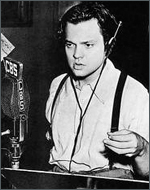

|
The War of the Worlds
Friday, May 23, 2008 | Music
The War of the Worlds was an episode of the American radio drama anthology series Mercury Theatre on the Air. It was performed as a Halloween special on October 30, 1938 and aired over the CBS Radio network. Directed by Orson Welles, the episode was an adaptation of H. G. Wells' classic novel The War of the Worlds.
The first half of the 60-minute broadcast was presented as a series of news bulletins, which suggested to many listeners that an actual Martian invasion was in progress (Because the Mercury Theatre on the Air was at that time a 'sustaining show' [without sponsorship], the broadcast had no commercial interruption). Some fled their homes; others merely were terrified. The news-bulletin format was decried as cruelly deceptive by some newspapers and public figures, leading to an outcry against the perpetrators of the broadcast, but the episode launched Welles to fame.
Welles's adaptation is arguably the most well-known radio dramatic production in history. It was one of the Radio Project's first studies.
H. G. Wells's novel is about an alien invasion of Earth, set in Woking, England at the end of the 19th century. The radio play's story was adapted by and written primarily by Howard Koch, with input from Orson Welles and the staff of CBS's Mercury Theatre On The Air. The action was transferred to contemporary Grover's Mill, a community that has since been annexed by West Windsor Township, New Jersey, and the radio program's format was meant to simulate a live newscast of developing events. To this end, Welles played recordings of Herbert Morrison's radio reports of the Hindenburg disaster for actor Frank Readick and the rest of the cast, to demonstrate the mood he wanted.
About half of the 55-and-a-half-minute play was a contemporary retelling of the events of the novel, presented as a series of news bulletins in documentary style. This approach to radio drama was not exactly new. Fr. Ronald Knox's satirical "newscast" of a riot overtaking London over the British Broadcasting Company in 1926 had taken a similar approach (and created much the same effect upon its audience). Welles had himself also been influenced by the Archibald MacLeish dramas The Fall of The City and Air Raid, the former using Welles himself in the role of a live radio news reporter. But the approach had never been done before with as much continued verisimilitude and the innovative format has been cited as a key factor in the confusion that would follow.

|


|

